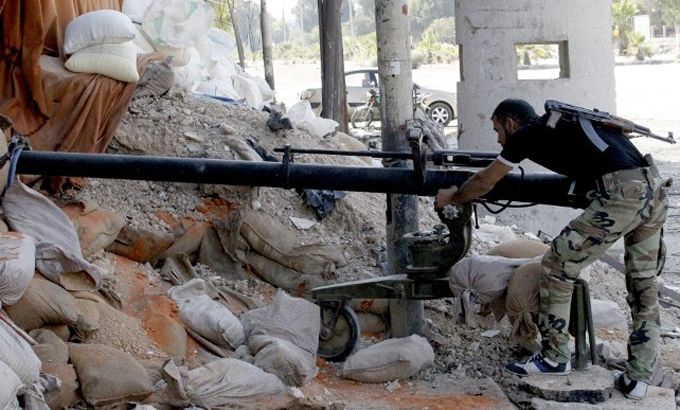Syrian opposition leader urges use of force
Ahmad Jarba says action should be taken under Chapter Seven of the UN charter to stop the war in Syria.

Ahmad Jarba, the Syrian opposition chief, has urged the UN Security Council to adopt a resolution under Chapter VII of the UN charter allowing use of force to cripple Syria’s “war machine”.
In a televised speech on Tuesday, Jarba said “ending the killing of Syrian people is only possible by stopping the regime’s war machine and barring it from using its aviation, missiles and artillery, and depriving it of its chemical weapons.”
Jarba, head of the opposition National Coalition, said this action should be taken “under Chapter VII of the UN Charter”.
Jarba, whose speech was delivered in Istanbul and broadcast by the Dubai-based Al-Arabiya satellite news channel, said a resolution under Chapter VII “paves the way to a solution to the Syrian crisis … that would lead to a democratic regime that will rebuild Syria”.
He accused the international community of “keeping silent on the crimes of the regime” and charged that this attitude allowed the Damascus regime to unleash chemical attacks.
“We don’t want to see the Assad regime use the hesitation [of the international community] as a green light to resume its odious crimes,” he said.
“We don’t want to see Assad continue to kill hundreds of thousands of Syrians with heavy weapons, with the protectionof an agreement allowing him to use all means to kill except chemical weapons.”
His comments came as envoys from the five Security Council permanent members met at UN headquarters in New York to discuss a French-drafted resolution on destroying Syria’s chemical weapons.
Diplomats said ambassadors from the US, Russia, Britain, France and China discussed a French text which included a demand for action under Chapter VII of the UN Charter if Syrian President Bashar al-Assad does not stick to the US-Russian plan.
Britain, France and the US are in favour of a strong resolution against Syria.
But Sergey Lavrov, Russian foreign minister, who agreed a deal on Saturday with his US counterpart John Kerry to dismantle and destroy Syria’s chemical arms stockpile by mid-2014, is opposed to a resolution that is under the chapter of the UN charter that allows the use of force.
Nearly an hour of initial talks ended with an agreement to meet again on Wednesday, diplomats said.
Tuesday’s meeting came a day after UN investigators confirmed the use of sarin nerve agent in an August 21 poison gas attack outside Damascus.
The talks come amid continued diplomatic wrangling over how to collect Syria’s arsenal of chemical and biological agents before the imposed deadline of 2014.
Foreign affairs specialist at The Times newspaper, based in the UK, Michael Binyon told Al Jazeera that the deadline acted in Assad’s favour.
“Assad is key to the giving up of the weapons, this deadline has given him a great advantage as he has to be there to deliver, ousting him before that time seems unlikely,” he said.
Binyon also said that while direct mention of Chapter VII might not be made in the resolution itself it would likely be included in a separate resolution or a note.
“The West may insist on some form of warning that will refer to serious consequences,” he said.
“The Americans, the French and their allies will have to be satisfied its clear enough to Assad that he will do what the resolution says.”